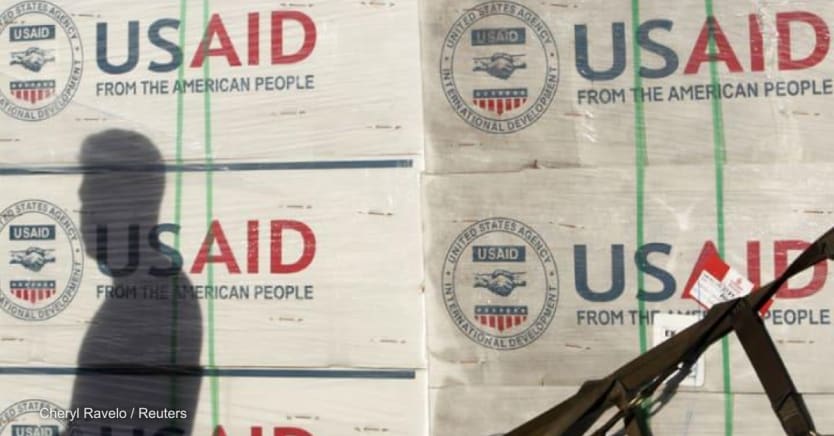
The U.S. Agency for International Development “faced significant policy, coordination, and strategic planning challenges in designing and implementing humanitarian and development programs” in Venezuela, a report from the USAID Office of Inspector General found.
The report, which the watchdog quietly released earlier this month, found that the former Trump administration’s political objectives consistently interfered with USAID’s response to the regional humanitarian crisis caused by Venezuela's political collapse. Over 5 million Venezuelans have fled the country since 2015, and millions still inside are in need of humanitarian assistance.
Of the 368 metric tons of aid USAID’s Office of Foreign Disaster Assistance and Office of Food for Peace sent to the Colombian border in 2019 — costing $2 million — only 8 metric tons were actually delivered inside Venezuela. The rest of the humanitarian assistance supplies, some of which were stored in a warehouse guarded by the Colombian military outside of Cúcuta, were distributed inside Colombia or sent to Somalia.
The report also found that the Trump administration used U.S. foreign assistance to shore up support for Juan Guaidó, an opposition figure who the U.S. recognized as the legitimate leader and interim president of Venezuela instead of President Nicolás Maduro. It said that the Office of the Administrator, then Mark Green, directed OFDA and FFP to “align their award decisions toward reinforcing the Interim Government’s credibility.”
This meant U.S. funding to the United Nations, which was capable of delivering humanitarian assistance inside the country, was minimized over Guaidó’s concerns that the U.N. was aligned with Maduro.
That politicization of aid was a cause for concern, USAID staff told OIG inspectors.
“In January and February 2019, the U.S. Government identified USAID’s humanitarian assistance for Venezuelans as also serving as a key tool to elevate support to the Venezuela Interim Government and increase pressure on the Maduro regime,” the OIG report found. “These directives communicated instructions to OFDA and FFP on the use of the Agency’s humanitarian assistance resources in response to the crisis, including taking actions that deviated from humanitarian principles and heightened security and fiduciary risks.”
Total USAID funding for the Venezuela regional crisis was $507 million for fiscal years 2017 to 2019, with $260 million for humanitarian assistance and $247 million for development assistance.
In early February 2019, the opposition government of Guaidó expressed its intent to force a delivery of aid across the border at a donor conference in Washington — in defiance of Maduro, who saw the move as part of a coup attempt.
Skyrocketing inflation had made it nearly impossible to afford basic supplies such as food and medicine, and millions of Venezuelans were fleeing the dire situation on foot. But Maduro denied his country was experiencing a humanitarian crisis and blocked delivery of the USAID supplies.
Clashes at Maduro-controlled border crossings led to the destruction of $34,000 of U.S. humanitarian supplies as the opposition attempted to get it into the country on February 23, 2019. The violent standoff made international headlines.
“This contributed to a tense environment for humanitarian assistance funded by or associated with the U.S. Government, as the Maduro regime publicly rejected pre-positioned commodities and initiated security crackdowns in Venezuela,” the report said.
USAID “pre-positioned” aid to Colombia using military aircraft from Florida in anticipation of its delivery across the bridge from Cucuta into Venezuela in February 2019, transportation the report found to be unnecessary because commercial transportation was available and less expensive.
The report also found that OFDA and the State Department Bureau of Population, Refugees, and Migration failed to develop joint strategic humanitarian response plans to coordinate strategy and programming at the country or regional level to deal with the Venezuela crisis, leading to confusion among agencies and partners over who was responsible for what.
Officials working for USAID’s Office of South America Affairs in the Latin America and Caribbean Affairs Bureau told auditors that they were being asked to carry out programming in which they had no expertise, in areas such as health and economic growth. They also said “they were effectively operating as a mission with the burden of working remotely, as they had no operational presence inside Venezuela.”
In response to a request for comment, USAID Acting Spokesperson Pooja Jhunjhunwala said the agency had seen the OIG report and cooperated during the audit.
“We welcome this and all reports that aim to improve the effectiveness of USAID’s work, especially in challenging operating environments,” Jhunjhunwala said. “As with all OIG Audit reports, USAID will address findings and recommendations. For safety and security reasons, USAID does not name our partners inside Venezuela.”








